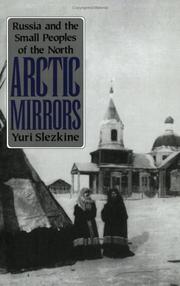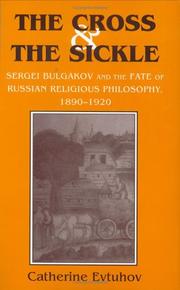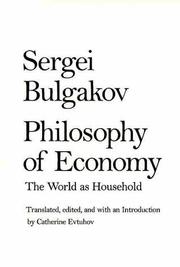| Listing 1 - 7 of 7 |
Sort by
|

ISBN: 1501703307 1501703315 9781501703317 0801429765 9780801429767 0801481783 9780801481789 9781501703300 Year: 1997 Publisher: Ithaca (N.Y.) : Cornell university press,
Abstract | Keywords | Export | Availability | Bookmark
 Loading...
Loading...Choose an application
- Reference Manager
- EndNote
- RefWorks (Direct export to RefWorks)
For over five hundred years the Russians wondered what kind of people their Arctic and sub-Arctic subjects were. "They have mouths between their shoulders and eyes in their chests," reported a fifteenth-century tale. "They rove around, live of their own free will, and beat the Russian people," complained a seventeenth-century Cossack. "Their actions are exceedingly rude. They do not take off their hats and do not bow to each other," huffed an eighteenth-century scholar. They are "children of nature" and "guardians of ecological balance," rhapsodized early nineteenth-century and late twentieth-century romantics. Even the Bolsheviks, who categorized the circumpolar foragers as "authentic proletarians," were repeatedly puzzled by the "peoples from the late Neolithic period who, by virtue of their extreme backwardness, cannot keep up either economically or culturally with the furious speed of the emerging socialist society." Whether described as brutes, aliens, or endangered indigenous populations, the so-called small peoples of the north have consistently remained a point of contrast for speculations on Russian identity and a convenient testing ground for policies and images that grew out of these speculations. In Arctic Mirrors, a vividly rendered history of circumpolar peoples in the Russian empire and the Russian mind, Yuri Slezkine offers the first in-depth interpretation of this relationship. No other book in any language links the history of a colonized non-Russian people to the full sweep of Russian intellectual and cultural history. Enhancing his account with vintage prints and photographs, Slezkine reenacts the procession of Russian fur traders, missionaries, tsarist bureaucrats, radical intellectuals, professional ethnographers, and commissars who struggled to reform and conceptualize this most "alien" of their subject populations. Slezkine reconstructs from a vast range of sources the successive official policies and prevailing attitudes toward the northern peoples, interweaving the resonant narratives of Russian and indigenous contemporaries with the extravagant images of popular Russian fiction. As he examines the many ironies and ambivalences involved in successive Russian attempts to overcome northern-and hence their own-otherness, Slezkine explores the wider issues of ethnic identity, cultural change, nationalist rhetoric, and not-so European colonialism.
Arctic peoples. --- Arctic peoples --- Indigenous peoples --- Aboriginal peoples --- Aborigines --- Adivasis --- Indigenous populations --- Native peoples --- Native races --- Ethnology --- Arctic races --- Circumpolar peoples --- Hyperboreans --- Russia, Northern --- Arctic Russia --- Kraĭniĭ Sever --- Northern Russia --- Northern Soviet Union --- Russia, Arctic --- Russian Arctic --- Russian-Siberian Arctic --- Soviet North --- Soviet Union, Northern --- Arctic regions --- History --- Ethnic relations. --- Politics and government. --- 323.15 <47> --- 323.15 <47> Nationale minderheden --(binnenlandse politiek)--Rusland. Sovjet-Unie --- Nationale minderheden --(binnenlandse politiek)--Rusland. Sovjet-Unie
Book
ISBN: 0822977451 9780822977452 0822961717 9780822961710 Year: 2011 Publisher: Pittsburgh, Pennsylvania
Abstract | Keywords | Export | Availability | Bookmark
 Loading...
Loading...Choose an application
- Reference Manager
- EndNote
- RefWorks (Direct export to RefWorks)
Country life --- History --- Nizhniĭ Novgorod (Russia) --- Civilization --- Economic conditions --- Social conditions --- Intellectual life

ISBN: 0801431921 1501724029 Year: 1997 Publisher: Ithaca (N.Y.): Cornell university press
Abstract | Keywords | Export | Availability | Bookmark
 Loading...
Loading...Choose an application
- Reference Manager
- EndNote
- RefWorks (Direct export to RefWorks)
Book
ISBN: 9781501724022 Year: 2018 Publisher: Ithaca, NY
Abstract | Keywords | Export | Availability | Bookmark
 Loading...
Loading...Choose an application
- Reference Manager
- EndNote
- RefWorks (Direct export to RefWorks)
Multi
ISBN: 9781501724022 Year: 2018 Publisher: Ithaca, N.Y. Cornell University Press
Abstract | Keywords | Export | Availability | Bookmark
 Loading...
Loading...Choose an application
- Reference Manager
- EndNote
- RefWorks (Direct export to RefWorks)

ISBN: 0300079907 Year: 2000 Publisher: New Haven (Conn.): Yale university
Abstract | Keywords | Export | Availability | Bookmark
 Loading...
Loading...Choose an application
- Reference Manager
- EndNote
- RefWorks (Direct export to RefWorks)
Economics --- Philosophy
Book
ISBN: 1281731153 9786611731151 0300132859 Year: 2000 Publisher: New Haven [Conn.] : Yale University Press,
Abstract | Keywords | Export | Availability | Bookmark
 Loading...
Loading...Choose an application
- Reference Manager
- EndNote
- RefWorks (Direct export to RefWorks)
The writings of Sergei Bulgakov (1871-1944), like those of other major social thinkers of Russia's Silver Age, were obliterated from public consciousness under Soviet rule. Discovered again after eighty years of silence, Bulgakov's work speaks with remarkable directness to the postmodern listener. This outstanding translation of Philosophy of Economy brings to English-language speakers for the first time a major work of social theory written by a critical figure in the Russian tradition of liberal thought. What is unique about Bulgakov, Catherine Evtuhov explains in her introduction to this book, is that he bridges two worlds. His social thought is firmly based in the Western tradition, yet some of his ideas reflect a specifically Russian way of thinking about society. Though arguing strenuously in favor of political and social liberty, Bulgakov repudiates the individualistic basis of Western liberalism in favor of a conception of human dignity that is compatible with collectivity. His economic theory stresses the spiritual content of life in the world and imagines national life as a kind of giant household. Bulgakov's work, with its singularly postmodern balance between Western and non-Western, offers fascinating implications for those in the process of reevaluating ideologies in post-Soviet Russia and in America as well.
Economics --- Philosophy, Russian. --- Philosophy.
| Listing 1 - 7 of 7 |
Sort by
|

 Search
Search Feedback
Feedback About UniCat
About UniCat  Help
Help News
News